NEWS
28/03/2017
Poles a smash hit in Berlin
This year’s Berlinale saw an exceptional showing from Polish filmmakers. They won numerous awards, including the Silver Bear Alfred Bauer Prize (for Agnieszka Holland’s Spoor) and a Crystal Bear (for Rafael Kapiński’s Butterfly Kisses); Zofia Wichłacz was announced one of this year’s ten Shooting Stars and Kuba Gierszał made it onto Variety mag’s list of Ten Europeans to Watch. “This proves without a doubt that we’re a part of the European filmmaking family,” said Agnieszka Holland.
Presenting Agnieszka Holland with the Silver Bear Alfred Bauer Prize for Spoor at the Berlinale Palast stage, actress Maggie Gyllenhaal asked: “What does a villain or protagonist of classic thrillers look like? Can they be a woman of 60 or 70, disrupting our traditional views of morality? The experiences of this director, Agnieszka Holland, serve to remind us that an artist is never completely satisfied – and their duty is to challenge conventional perspectives.”
“We live in very difficult times. We need new perspectives, we need bold movies on issues important for our planet,” said the director of Spoor as the Berlin jury praised her work. The same award, the Alfred Bauer Prize, was given eight years earlier to Andrzej Wajda – who passed away in 2016 – for his Sweet Rush. This is fairly symbolic: a unique award for “movies that open new perspectives in filmmaking” received by two masters of Polish cinema. Two creators of classic films, two people who did not let their age and experiences scare them away from experimenting, pushing boundaries, and – as Holland said herself – stepping out of their creative comfort zone.
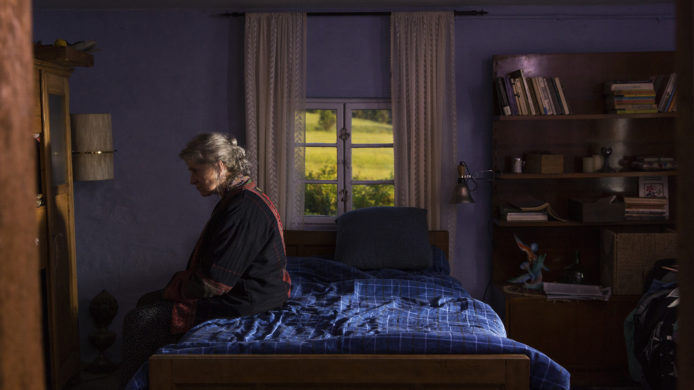
SPOOR dir. Agnieszka Holland
“It’s not just Poland, the problem is the same throughout Europe: filmmaking is an extremely expensive enterprise, so people naturally gravitate to well-trodden paths,” Agnieszka Holland said in Berlin. “Now, however, we need movies that go against the grain. They don’t necessarily need to be political, but they have to have courage and passion. They have to unsettle, provoke, and pose profound questions.”
We need movies that go against the grain. They don’t necessarily need to be political, but they have to have courage and passion. They have to unsettle, provoke, and pose profound questions – Agnieszka Holland said in Berlin
Spoor was a hit in Berlin as its charm and epic storytelling for wide audiences was tinged with arthouse flair. It talks of hunting and murder while touching upon a common fear in our times – the fear of more or less legally sanctioned oppression (women and animals are its main targets in Spoor). “A subliminal social fear and a sense of hurt and injustice are becoming the sign of our times – but we also feel this need for rebellion or utopia,” Holland admitted. “The three of us – me, Olga Tokarczuk, who wrote Drive Your Plow over the Bones of the Dead, and Kasia Adamik – wanted to reflect this through the tale of an old woman (Duszejko happens to be my age) who doesn’t want to be compliant, who rejects arbitrary norms, social roles, and modes of behavior. I wanted to do this even though I obviously fundamentally disagree with this character on a number of issues.”
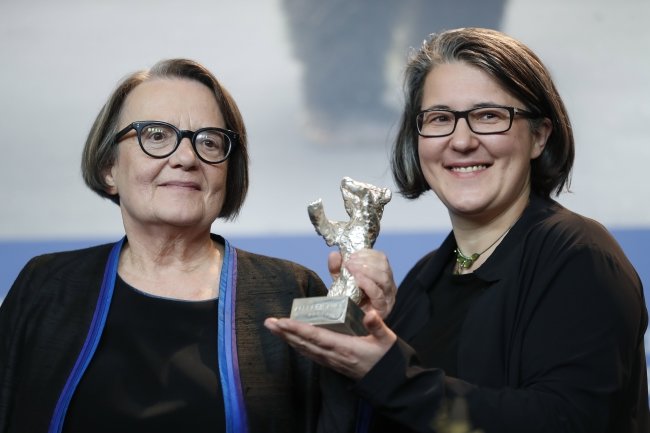
Agnieszka Holland and Kasia Adamik / Berlinale 2017
Holland’s film had several interpretations in Berlin: as a feminist drama (thanks in part to Agnieszka Mandat’s stellar performance), a cinematic joke on everyone who’s “100% sure they’re right,” and a stylistic experiment. “We bounce between conventions and genres, creating a world that seems realistic, but is actually highly stylized. It’s part thriller, part crime film, and part fable. We did that because we wanted the viewers to not take our story literally,” Holland explained.
Many reviewers saw Spoor as a punchy ecological manifesto, a pointed response to the events around the world and, surprisingly, particularly relevant in Poland. A scant few weeks after the premiere of Spoor, the Polish media revealed that the Minister of Environment, Jan Szyszko, participated in a captive-bred pheasant hunt. The Minister didn’t consider it inappropriate at all, referring to hunting as “the most humanitarian way of harvesting prime animal-based food.”
The long-awaited feature debut of Polish director Rafael Kapeliński proved one of the biggest discoveries at the 2017 Berlinale
The long-awaited feature debut of Polish director Rafael Kapeliński proved one of the biggest discoveries at the 2017 Berlinale. Highly praised by critics, his Butterfly Kisses, filmed in England, received the Crystal Bear for the best film in the Generation 14plus category.
The teenage protagonists of Butterfly Kisses live at the Stockwell housing estate in South London, “wasting time” with their buddies. Jake (Theo Stevenson), Kyle (Liam Whiting), and Jarred (Byron Lyons) spend their days clowning in the yard, partying, drugs, and chatting about girls and porn. Though shot in black and white, Butterfly Kisses ventures far beyond the conventions of typical English realism. Nathan W. Klein’s mesmerizing organ music, Nick Cooke’s lyrical photography, mysterious symbols (like the horse that appears at various times), and a melancholy tone transform Butterfly Kisses into a metaphorical parable about discovering the shocking and terrifying aspects in oneself and in others. The terrifying secret in this film is the protagonist’s unwanted, repressed, and growing desire for a little girl.
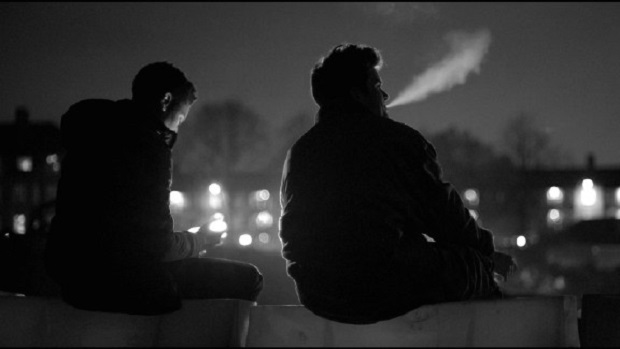
BUTTERFLY KISSES dir. Rafael Kapeliński
This film “attempts to handle a considerably darker topic than its coming-of-age set-up initially leads you to expect, and it’s a mark of the film’s class that it does it with a visual elegance that is well above par for low-budget UK estate realism,” wrote Jonathan Romney in Screen. Der Tagesspiegel‘s Kirsten Taylor wrote: “Butterfly Kisses isn’t meant to shock or strike down taboos. This film doesn’t explain or analyze the root of the issue; it neither defends nor accuses. It just shows a very lonely young man who doesn’t know how to win the battle against his own desires.”
Rafael Kapeliński not only lives in London, but also teaches filmmaking at the London Film School. His sixty students from all around the world study “audiovisual storytelling” on Wajda’s Ashes and Diamonds, Kieślowski’s A Short Film about Love, or works of Wojciech Jerzy Haas. After Butterfly Kisses won the Crystal Bear, Kapeliński was hailed as the new hope of British cinema. The sentiment made the director smile: “My heart is definitely Polish, even if my head’s wired somewhat differently because I’ve been living and working abroad for almost 30 years now,” he admitted. “I’ll never become a typical British director. Why should I? I’ll always be a little bit different and odd; I hope this will prove an asset in filmmaking.”
Screened in the Forum section of the Berlinale “A Heart of Love” directed by Łukasz Ronduda shows the union of two unique personalities who treat each other and the world as the substance of constant performance art
Two other films by Polish creators, screened in the Forum section of the Berlinale, also gained widespread acclaim: A Heart of Love and Animals. The former, directed by Łukasz Ronduda, chronicles the fascinating relationship between two visual artists. It’s not only interesting because Robert Bolesto’s script was based on the real lives of Wojciech Bąkowski and Justyna Wasilewska (depicted by Jacek Poniedziałek and Zuzanna Bartoszek); A Heart of Love shows the union of two unique personalities who treat each other and the world as the substance of constant performance art. Bąkowski records ambient sounds and arranges them into cacophonous mosaics; his sleeping partner or their breakup become the subjects of his works and performances. Wasilewska arranges appliances (a boiling kettle, water pouring from a faucet) into an installation in a gallery. Even her illness – atopic dermatitis and hair loss – becomes a work of art. They seem symbiotically linked, yet entangled in constant rivalry, “stealing” from each other and trying to rip free. Living life to the fullest, they’re nevertheless immersed in modernity: constant creation, mediated life, and sometimes unhealthy levels of self-centeredness.
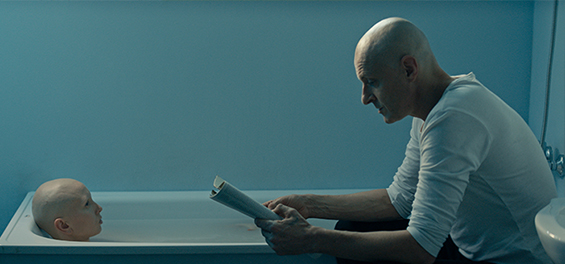
HEART OF LOVE dir. Łukasz Ronduda
Greg Zgliński made an even stronger showing in Berlin. Following his excellent debut One Long Winter Without Fire and the subsequent Courage, which was shot in Poland, Zgliński returned to Switzerland to film Animals, devilishly witty yet engrossing like the best thrillers – a cavalier parable about the illusory line that divides reality and creation, life and death… And about betrayal and irreversible loss.
“One of the most pleasant surprises in the Forum programme this year was this wickedly surreal, perverse marital comedy from Polish original Greg Zglinski, in which an Austrian couple lose all sense of themselves — and each other — on a professional sabbatical to idyllic rural Switzerland,” wrote Variety’s Guy Lodge; the magazine listed Zgliński’s Animals as one of the ten best movies of the Berlin festival.
Nothing in this movie is what it seems. Nick (Philip Hochmair) cheats on his wife – or maybe the betrayal is imaginary. Anna (Birgit Minichmayr) hears a talking cat, sees the day as night, and bilocates, appearing inside and in front of her house at once. “I know that some might consider Animals odd, but as weird and crazy as it is, this film is very dear to me,” Zgliński admitted.
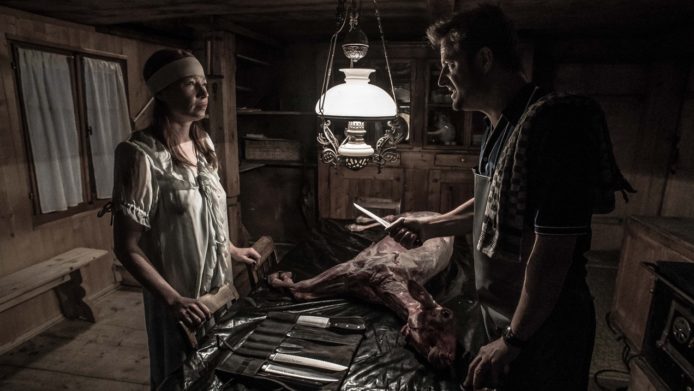
ANIMALS dir. Greg Zgliński
Polish artists were lauded many more times during this year’s Berlinale. Kuba Czekaj screened his Erlprince in the Generations section and also won the Baumi Award (named in honor of the acclaimed producer Karl Baumgartner, the founder of Pandora Film) for his screenplay Sorry Poland. Singer Maria Peszek’s Sorry Polsko inspired this story about a jaded 40-something dancer. Shooting is planned to start in 2018.
Zofia Wichłacz (Jan Komasa’s Warsaw 44, Andrzej Wajda’s Afterimage, Kasia Adamik’s Amok) received the prestigious Shooting Star 2017, an award given to the most talented European actors with the potential for international career. “She has a strength that remains in our eye long after the lights go out. Not only do we want to look for her in the future, we are simply compelled to do so.” wrote the jurors. Additionally, Variety placed Jakub Gierszał (Spoor; Lure; All That I Love) on its Ten Europeans to Watch list.
Polish filmmakers contribute something very important to cinema: a dash of insanity, cheekiness, and something less obvious. As well as exceptional talent – Dieter Kosslick, director of Berlinale stated
As festival director Dieter Kosslick said, “It’s natural that Polish creators are increasingly more present and recognized at the Berlin festival.” It’s worth remembering that Tomasz Wasilewski received the Silver Bear in 2016 for his screenplay to United States of Love and Małgorzata Szumowska won the same award in the previous year for directing Body/Cialo. That was just the beginning of their rise to fame: Body/Cialo won the Audience Award at the European Film Festival and United States of Love were screened in various parts of the world – the list includes Great Britain, Denmark, Sweden, Romania, Netherlands (premiering on March 2nd) and France (April 5th).
“Polish filmmakers contribute something very important to cinema: a dash of insanity, cheekiness, and something less obvious,” Dieter Kosslick stated. “As well as exceptional talent. Talented filmmakers – older, younger, and very young – abound in Poland.”
—Paweł T. Felis (translated by Dariusz Kołaczkowski)